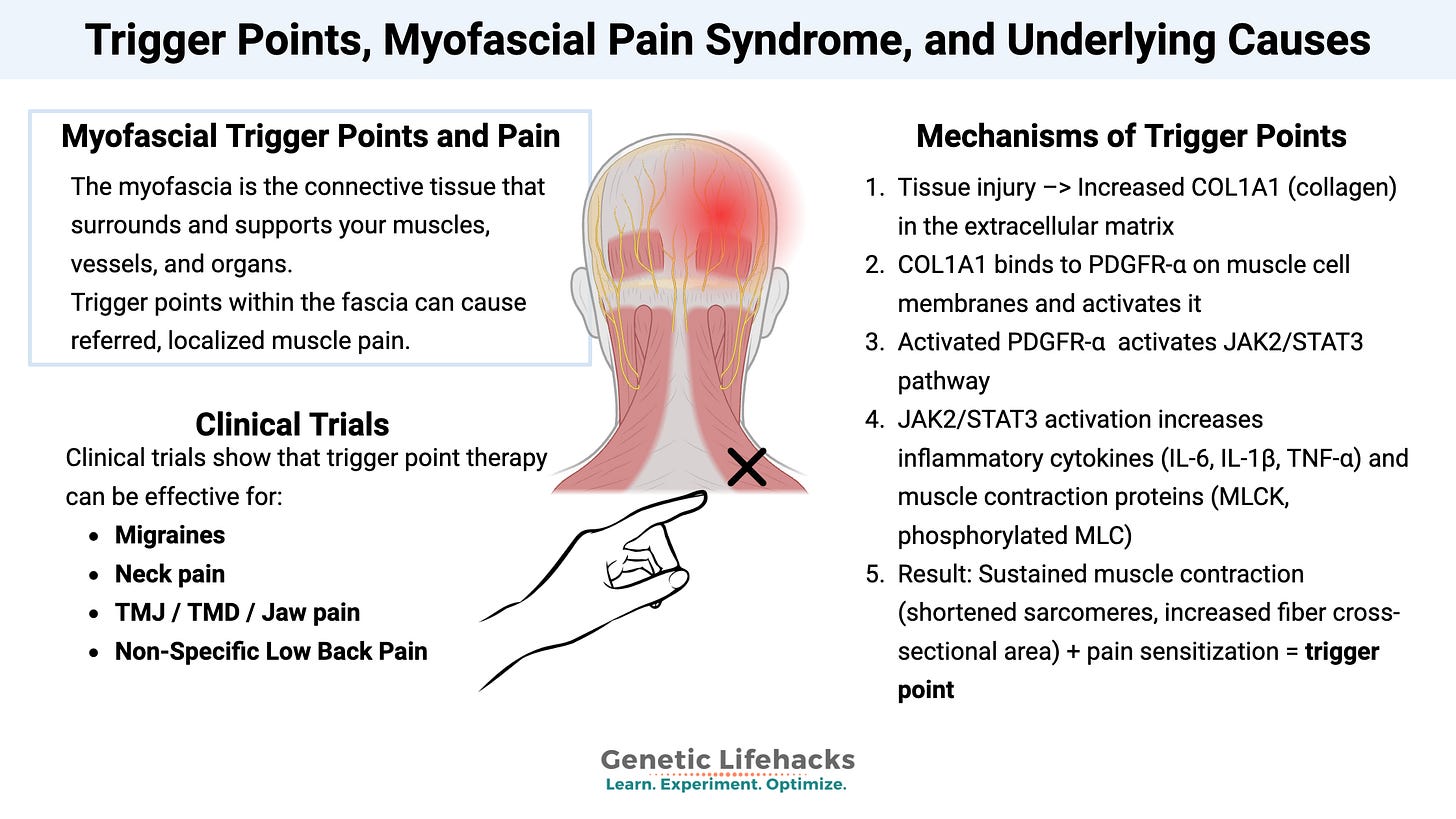Trigger Points Explained (+ Share Your Story)
We’ve all had times when something hurts: hand pain from too much time at the keyboard, foot pain from pickleball, neck pain after camping, shoulder pain from who knows what...
My story:
When something hurts, I usually go through a phase of watching YouTube videos on how to get rid of X pain, then read WebMD to see if it is cancer, and consider for a bit whether it is bad enough to see a doctor. Eventually, I will remember that I have a big book on my shelf about trigger points, and I look up the trigger point location causing the pain to persist.
Trigger points are hypersensitive knots that, for me, usually cause referred pain somewhere nearby. Sometimes, just pressing and holding the trigger point is like magic (other times, it just hurts).
So I decided it was time to really dig into what is going on -- what causes trigger points, why are they more painful or common for some people, etc. If you’re interested, check out my latest article Trigger Points, Myofascial Pain Syndrome, and Underlying Causes.
Your story:
Genetic Lifehacks is all about giving you the tools and information to optimize your own health.
It’s not about me... although my story often guides what I research.
I would love to feature some of your stories.
How did you use the information on Genetic Lifehacks to figure out how to optimize your health?
If you’re willing for me to share your story (I’ll keep it anonymous) with everyone getting this newsletter, reply to this email or send me a separate email with what I can share. It doesn’t have to be long or life-changing. Sometimes it’s the little breakthroughs that make all the difference, and sharing what works for you may help someone else in a similar situation. I’ll compile the stories to share over the next few weeks, with names withheld.
Updates:
I’ve updated several articles this week:
Multiple chemical sensitivity: New research on the differences found in the gut microbiome of people with MCS.
Fatty liver and NAFLD: Added information on how increasing inulin, a prebiotic fiber and a polymer made of fructose chains, may change the gut microbiome in ways favorable to liver health.
APOE: I’ve added a few more research studies and have the SNP table set up to flag your APOE type (if it is in your raw data). Please consider whether you want to know your Alzheimer’s risk before reading the article.
Grateful for all of your support,
~ Debbie
P.S. No longer an active member? Consider rejoining today.
Latest on Longevity Lifehacks:
Coffee consumption and dementia
My latest Longevity Lifehacks article looks at the studies on how and why coffee or caffeine may be beneficial for preventing dementia. Yes, I put in an interesting genetic connection, as well, narrowing down who will benefit the most.
What I’ve been reading:
1. Urolithin A, mitochondrial function in the brain, and anxiety
A new study used urolithin A in animals bred to have heightened anxiety. Urolithin A added to their food reversed the nervous behavior in the animals with a genetic propensity towards stress anxiety. The changes in the brain were related to the medium spiny neuron architecture and the mitochondrial function in these neurons.
2. Green light exposure in children with autism disorder: a pilot study
This 2024 study looks at how green light exposure reduced anxiety in children with autism undergoing dental procedures.
3. Sucralose Associated With Weaker Responses to Immunotherapy
Researchers found that immunotherapy for cancer is less likely to be effective for patients if they are consuming sucralose. This raises a bunch of questions on how changes to the gut microbiome (eg from sucralose) impact the body’s immune response.



